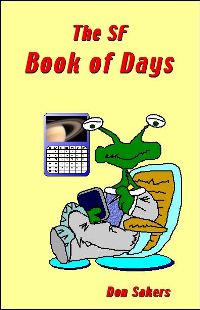Error message
- Deprecated function: The each() function is deprecated. This message will be suppressed on further calls in _menu_load_objects() (line 569 of /home2/dsakers/public_html/sw/includes/menu.inc).
- Deprecated function: implode(): Passing glue string after array is deprecated. Swap the parameters in drupal_get_feeds() (line 394 of /home2/dsakers/public_html/sw/includes/common.inc).
The SF Book of Days
Don Sakers
A Datebook Like No Other
The SF Book of Days is a unique treat for science fiction and fantasy fans. Here is at least one science fiction/fantasy event for every day of the year - and for quite a few days that aren't part of the year. Drawn from classic sf/fantasy stories, books, comics, TV shows, and movies, events are arranged in a day-by-day format. When possible, publication or production dates are included to allow the reader to place each event in historical context.
Here you'll also find months from worlds that have no relation to our own, lists of alternate and alien names for the months and days of our lives, and a short informative essay on calendars and calendar reform.
Covering important sf/fantasy dates from Doc Brown's arrival in Hill Valley (January 1, 1885) to the launch of the Bellerophon to a certain Forbidden Planet (Sextor 7, 2351) and beyond, this datebook is truly out of this world.
Don Sakers's THE SF BOOK OF DAYS doesn't need much reviewing: It's there, it offers "a science fiction/fantasy event for every day of the year...and for quite a few days that _aren't_ part of the year," and it even tosses in lists of names for alien months and other names for the days of the week (including ten-day weeks!). Thus Sunday is variously Sunnendei, Senkyeh, Kriakos, Elenya, and so on.
This one is for fans who just cannot survive without knowing that Wildfire joined the Legion of Super-Heroes and explorer Cogdon Nestor wrote to Edgar Rice Burroughs to report a telegraph in the desert on the same day, June 1, of 2981 and 1916, respectively.
Have fun!
Analog October 2004, p. 136
written by Tom Easton
<p>
Don Sakers has compiled a fun book entitled <em>The SF Book of Days</em>. In this work, he has gone through numerous science fiction and fantasy works, both on film and written, and harvested a listing of events which occurred on specific days. In addition to listing fictional events, Sakers has elected to pepper the book with references to historical events, such as the Hugo Gernsback's birthday (August 16).</p>
<p>
While Sakers does not claim the book is complete, and in fact asks readers to send him additional dates for future editions, there are some rather obvious omissions. The birthdays of the crewmembers of the Enterprise are well documented, yet do not appear in the book. On the other hand, certain areas, which one imagines are close to Sakers' heart, receive a tremendous amount of attention, perhaps most notably dates associated with the Legion of Super Heroes comics.</p>
<p>
The inclusion of some historical events and not others is as haphazard as the inclusion of some fictional events, but it raises more questions. While it is understandable that Sakers was unable to vet every piece of science fiction and fantasy for specific dates, the inclusion of the Apollo 1 Fire (January 27) begs the question as to why Sakers did not include the <em>Challenger</em> Explosion (January 28) or the <em>Columbia</em> Disaster (February 1).</p>
<p>
IN fact, the book is much more than just a listing of dates and events. While the reader may begin by looking up February 11 and learning that this was the date in 1868 in which the Nautilus entered in the Mediterranean and in 2958 Rokk Krinn (Cosmic Boy) was (will be?) born, Sakers includes much more information about fictitious dates and calendars. An appendix discusses how and why calendars are created as well as why calendars differ from each other. There is also a simple chart showing alternate names for the days of the week. In both these cases, and throughout the book, Sakers is very good about providing credit for the information he includes.</p>
<p>
Sprinkled throughout the book are dates which don't fall easily into the traditional calendar, along with a brief explanation of the months to which Sakers is referring and their source material. This permits him to include intercalendary events like Armstrong Day (between June and July or Tishri, a Hebrew month with dates which move in reference to the traditional calendar.</p>
<p>
In his introduction, Sakers provides an explanation for the book, which comes down to one simple reason. The idea is fun. Fortunately, Sakers's implementation of the idea is also fun. Despite its shortcomings, which Sakers seems willing to correct in future editions, <em>The SF Book of Days</em> is a fun, if trivia-oriented, addition to a science fiction fan's bookshelf.</p>
<p class="rteright">
Steven H. Silver<br />
SF Site</p>

